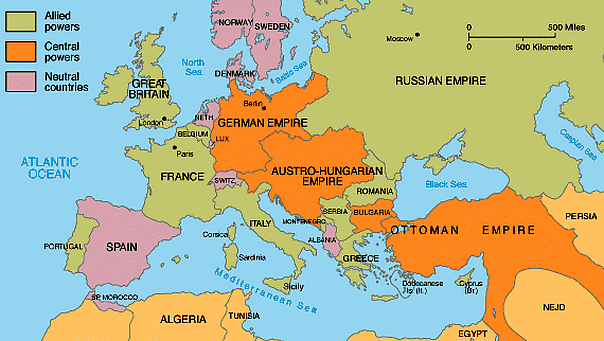
The History of Switzerland's Neutrality
World War One
With the start of World War One, Switzerland proclaimed it's neutrality almost immediately. However, surrounded by both the Central Powers of Germany and Austria-Hungary and the Entente Powers of Italy and France, Swiss troops were deployed to their borders in order to prevent the trench warfare from spilling over into the Swiss borders. These troops remained at the ready from 1914-1918.

The majority of these troops were deployed to along the French border in the area of Jura while smaller groups where stationed along the German and Italian borders.
At the start of WWI, Switzerland's military was close to 250,000 troops. As the war progressed and it became clear that both sides would respect Switzerland's neutral status, troops began to withdraw from the borders until only 35,000 troops remained active by the end of WWI.
Swiss troops stationed in a trench along the
French border during WW1.

As a strategically located and neutral country during one of the bloodiest wars the world has ever seen, Switzerland became a safe haven for those escaping prosecution. Switzerland also opened up their borders to Prisoner of War camps, ensuring the safety and rights of POW's from both sides.
Regardless of Switzerland's declared neutrality, cultural and language differences divided the Swiss population as many French and Italian speakers sympathized with the Entente powers while German speakers looked toward Germany. The tension between regions in Switzerland became evident in the propaganda Swiss citizens were exposed too. Newspapers and magazines began reporting war events with increasing differences based upon where the loyalties of the citizens lay.

"Three young girls from western Switzerland - gaily wearing their winning spring dresses." This postcard was published in 1916; notice the use of the word "winning" and the colors of the girls dresses.
The "Grimm-Hoffmann affair" of 1917 questioned the integrity of Switzerland's neutrality on an international scale. Robert Grimm was a socialist politician who traveled to Russia as a self-designated Swiss diplomat and representative. He tried brokering a peace pact between Russia and Germany in order to end the war on the Eastern front. He was soon discovered as a fraud and Switzerland's neutral reputation was soon restored.
With the end of World War One, Switzerland signed the Treaty of Versailles. While Swiss banks saw a slight boom during WWI, other aspects of the economy like overall exports suffered greatly and Switzerland, like the rest of Europe, spent the next few years trying to recover.

A trench between the border of Germany and Switzerland.